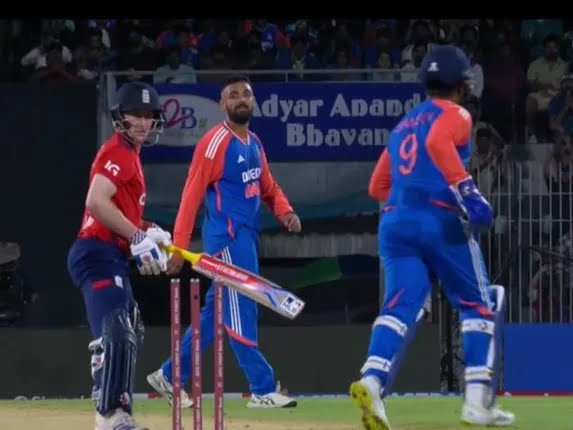
Despite a strong start in the fourth T20I, England faltered in their run chase, raising concerns about their decision-making under pressure. From Harry Brook’s ill-timed aggression to Jamie Overton’s overconfidence in retaining the strike, England let crucial moments slip away on Friday.
Is Brendon McCullum’s tactic of aggressive intent becoming a double-edged sword for England?
So far in the series, 24 out of 38 England wickets have fallen to spin, highlighting their ongoing struggles against slower bowling. And they cannot keep using fog as an excuse for their failures.
Harry Brook and Philip Salt, considered key players for England’s future, have particularly been underwhelming. Except for their contributions in the fourth T20I, both have repeatedly failed to deliver. Even in that game, despite being in commanding positions, they threw their wickets away cheaply in an attempt to keep attacking rather than consolidating.
England’s struggles against spin aren’t limited to white-ball cricket. In red-ball cricket last year, their inability to handle Pakistan’s spin duo of Sajid Khan and Nauman Ali—despite dominating the pacers in the first Test—ultimately led to a 1-2 series loss.
This raises an important question: Is McCullum’s approach of relentless attacking cricket under the guise of a fancy term, ‘Bazball’, ignoring England’s biggest weakness? While they might rack up big totals on flat decks, their decision-making crumbles when faced with turning pitches or high-quality spinners.
Their T20 World Cup defense last year was a similar story. India’s spin trio of Axar Patel, Kuldeep Yadav, and Ravindra Jadeja dismantled England, taking a combined 6/58 in 11 overs while defending 172, bowling them out for just 103.
Apart from Jos Buttler and Ben Duckett—who average 42.69 and 34.50, respectively, with strike rates above 140 against spin—none of England’s top-order batters have performed well against slow bowling. Brook, the team’s vice-captain and a future leader, has particularly poor numbers against spin compared to pace. While he averages 52 and strikes at 165 against pace, those numbers plummet to 16 and 118 against spin.
Opener Philip Salt also struggles against spin, despite his overall T20I figures being better than Brook’s and Liam Livingstone’s.
The looming question remains: Can England’s latest approach, armed with strategic recommendations from experts, help them overcome their spin troubles, or will the addition of an experienced player like Joe Root—who is currently excelling in the SA20 as the third-highest run-getter—make the difference?
For context, Root has scored 375 runs in nine innings at an average of 53.57 and a strike rate of 128.86, with two half-centuries in 10 T20Is in India.



